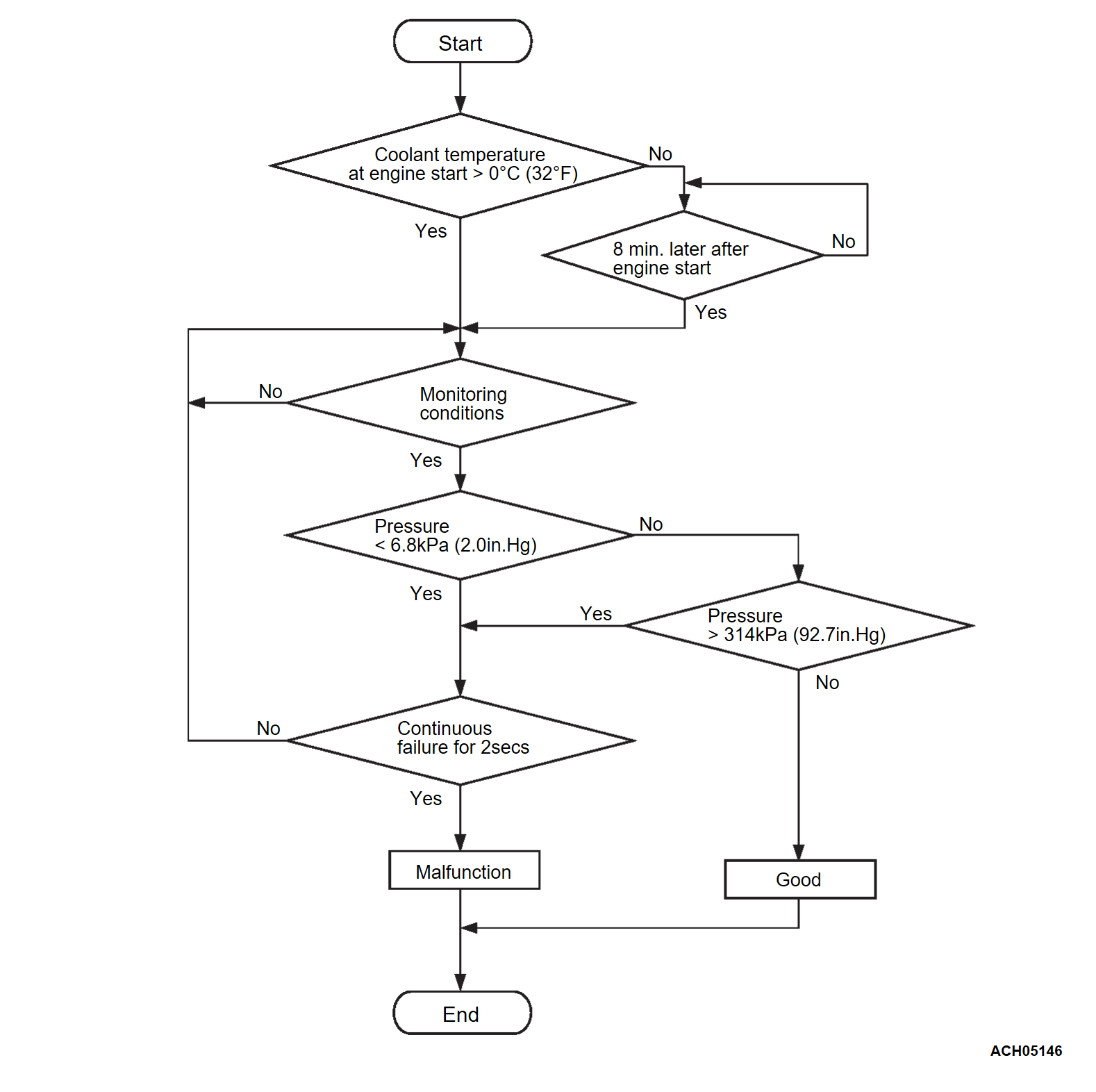DTC P0108: Manifold Absolute Pressure Circuit High Input
CIRCUIT OPERATION
- A 5-volts voltage is supplied to the manifold absolute pressure sensor power terminal from ECM terminal MAP5. The ground terminal is grounded with ECM terminal MAPE.
- A voltage that is proportional to the intake manifold pressure is sent to the ECM terminal MAP from the manifold absolute pressure sensor output terminal.
TECHNICAL DESCRIPTION
- The manifold absolute pressure sensor outputs a voltage which corresponds to the intake manifold pressure.
- The ECM checks whether this voltage is within a specified range.
DESCRIPTIONS OF MONITOR METHODS
- Manifold absolute pressure sensor output voltage is out of specified range.
MONITOR EXECUTION
- Continuous
MONITOR EXECUTION CONDITIONS (Other monitor and Sensor)
Other Monitor (There is no temporary DTC set in memory for the item monitored below)
- Not applicable
Sensor (The sensor below is determined to be normal)
- Engine coolant temperature sensor
- Throttle position sensor
- Mass airflow sensor
- Intake air temperature sensor 1
- Barometric pressure sensor
- Boost pressure sensor
DTC SET CONDITIONS
Check Condition
- 8 minutes or more have passed since the engine starting sequence was completed, when the engine coolant temperature at engine start is 0°C (32°F) or lower.
Judgment Criterion
- Manifold absolute pressure sensor output voltage is more than 4.6 volts [corresponding to a manifold absolute pressure of 314 kPa (92.7 in.Hg)] for 2 seconds.
FAIL-SAFE AND BACKUP FUNCTION
- Estimate the throttle opening degree and the intake manifold pressure given by a normal sensor, and then carry out the fuel control.
- Intake charge pressure is restricted.
TROUBLESHOOTING HINTS (The most likely causes for this code to be set are:)
- Manifold absolute pressure sensor failed.
- Open manifold absolute pressure sensor circuit, or connector damage.
- ECM failed.
DIAGNOSIS
STEP 1. Using scan tool (M.U.T.-IIISE), check data list item 8: Manifold Absolute Pressure Sensor.
| caution | To prevent damage to scan tool (M.U.T.-IIISE), always turn the ignition switch to the "LOCK" (OFF) position before connecting or disconnecting scan tool (M.U.T.-IIISE). |
(2) Turn the ignition switch to the "ON" position.
(3) Set scan tool (M.U.T.-IIISE) to the data reading mode for item 8, Manifold Absolute Pressure Sensor.
- When altitude is 0 m (0 foot), 101 kPa (29.8 in.Hg).
- When altitude is 600 m (1,969 feet), 95 kPa (28.1 in.Hg).
- When altitude is 1,200 m (3,937 feet), 88 kPa (26.0 in.Hg).
- When altitude is 1,800 m (5,906 feet), 81 kPa (23.9 in.Hg).
(4) Start the engine.
- When the engine is idling, 27 - 47 kPa (8.0 - 13.9 in.Hg).
- When the engine is suddenly revved, manifold absolute pressure varies.
(5) Turn the ignition switch to the "LOCK" (OFF) position.
Is the sensor operating properly?
STEP 2. Measure the resistance at manifold absolute pressure sensor connector.
(1) Disconnect the connector and measure at the harness side.
(2) Measure the resistance between terminal MAPE line and ground.
- Continuity (2 ohms or less)
Does continuity exist?
STEP 3. Check of open circuit and harness damage in MAPE line between manifold absolute pressure sensor connector and ECM connector.
Is the harness wire in good condition?
STEP 4. Using scan tool (M.U.T.-IIISE), check data list item 8: Manifold Absolute Pressure Sensor.
(1) Turn the ignition switch to the "ON" position.
(2) Set scan tool (M.U.T.-IIISE) to the data reading mode for item 8, Manifold Absolute Pressure Sensor.
- When altitude is 0 m (0 foot), 101 kPa (29.8 in.Hg).
- When altitude is 600 m (1,969 feet), 95 kPa (28.1 in.Hg).
- When altitude is 1,200 m (3,937 feet), 88 kPa (26.0 in.Hg).
- When altitude is 1,800 m (5,906 feet), 81 kPa (23.9 in.Hg).
(3) Start the engine.
- When the engine is idling, 27 - 47 kPa (8.0 - 13.9 in.Hg).
- When the engine is suddenly revved, manifold absolute pressure varies.
(4) Turn the ignition switch to the "LOCK" (OFF) position.
Is the sensor operating properly?
STEP 5. Using scan tool (M.U.T.-IIISE), check data list item 8: Manifold Absolute Pressure Sensor.
(1) Turn the ignition switch to the "ON" position.
(2) Set scan tool (M.U.T.-IIISE) to the data reading mode for item 8, Manifold Absolute Pressure Sensor.
- When altitude is 0 m (0 foot), 101 kPa (29.8 in.Hg).
- When altitude is 600 m (1,969 feet), 95 kPa (28.1 in.Hg).
- When altitude is 1,200 m (3,937 feet), 88 kPa (26.0 in.Hg).
- When altitude is 1,800 m (5,906 feet), 81 kPa (23.9 in.Hg).
(3) Start the engine.
- When the engine is idling, 27 - 47 kPa (8.0 - 13.9 in.Hg).
- When the engine is suddenly revved, manifold absolute pressure varies.
(4) Turn the ignition switch to the "LOCK" (OFF) position.
Is the sensor operating properly?
STEP 6. Replace the manifold absolute pressure sensor.
(1) Replace the manifold absolute pressure sensor.
(2) Carry out a test drive with the drive cycle pattern. Refer to Diagnostic Function - OBD-II Drive Cycle - Pattern 1  .
.
 .
.(3) Check the diagnostic trouble code (DTC).
Is DTC P0108 set?
 The inspection is complete.
The inspection is complete.![[Previous]](../../../buttons/fprev.png)
![[Next]](../../../buttons/fnext.png)

